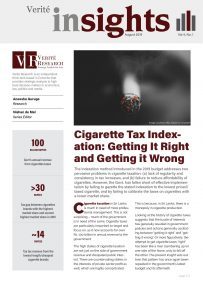කෝවිඞ් -19 වෛරසය පැතිරීම අවම කිරීම සඳහා ගෙන ඇති ක්රියාමාර්ග හේතුවෙන් ශ්රී ලංකා රජය අයවැය හා ආදායම් අර්බුදයකට මුහුණ දී තිබේ. මෙම අර්බුදයේ බොහෝ අවාසි පැවතුනත්, මෙම තත්ත්වය, ඇතැම් පාර්ශවකරුවන්ගේ අභිලාෂයන් අනුව කටයුතු කිරීමෙන් ඈත් වී, දුම්වැටි බදු ක්රියාත්මක කරන ආකාරය ක්රමවත් කිරීමට රජයට හොඳ අවස්ථාවක් ලෙස භාවිත කල හැකිය. මෙම විශ්ලේෂණය පෙන්වා දෙන්නේ ලංකාවේ දුම්වැටි බදු සහ මිල ගණන් ඉහල දැමීම, රාජ්ය මුල්ය කළමනාකරණ මුල ධර්ම වලට අනුකුලව සිදු වී නොමැති බවයි. රට රාජ්ය මුල්ය අර්බුදයකට මුහුණ දී තිබෙන අවස්තාවක උදාවන, මැයි 31 වන දිනට යෙදී තිබුන ලෝක දුම්කොළ විරෝධී දිනය අපට සිහිපත්කර දෙන්නේ දුම්වැටි බදු ක්රමානුකුලව ඉහල දැමීමට අසමත් වීම ශ්රී ලංකාවේ ආර්ථික ප්රතිපත්තියේ බරපතල අසාර්ථකත්වයක් බවයි.
At the end of 2018, the EPF resolved to re-enter the stock market despite substantial losses and allegations of mismanagement on EPF’s equity investments in the past. The EPF provides two reasons for the decision: (i) that members will benefit from higher returns; (ii) that the increase in EPF loanable funds will soon outstrip government requirements for additional borrowing. This Insight proves that both these reasons are analytically flawed.
2018 වසරේ ඔක්තෝම්බර් මාසයේ දී, කොටස් වෙළඳපොලේ සිදුකරන සේවක අර්ථසාධක අරමුදලේ ආයෝජන නැවත වරක් පුළුල් කරන බව මහ බැංකුව විසින් නිවේදනය කළේය. මහ බැංකුව විසින් එම තීරණය ගැනීමට හේතු ලෙස ඉදිරිපත් කරන ලද කාරණා දෙකම විශ්ලේශනාත්මක වශයෙන් දෝෂ සහිත බවත්, එබැවින් සේවකයින්ගේ විශ්රාමික ඉතිරි කිරීම් අහිතකර බලපෑමකට ලක්වීමේ නව අවදානමක් ඇතිවී තිබෙන බවත් මෙම විදසුන පෙන්වා දෙයි.
The indexation method introduced in 2019 Budget addresses two pervasive problems in cigarette taxation: (a) lack of regularity and consistency in tax increases, and (b) failure to reduce affordability of cigarettes.
There are three false claims that have been prevalent in print media, in relation to the tax and price increases of cigarettes in the last quarter of 2016. The claims were that (i) tax revenue reduced, (ii) beedi consumption increased, and (iii) CTC lost economic value. The Insight provides analysis that contests all three claims.
Sri Lanka is a signatory to the International Treaty, Framework Convention on Tobacco Control since 2003. It has not yet implemented the provisions relating to protecting tobacco policy from vested interests. This Insight explores the consequences of not doing so and meaningful steps that can be taken towards mitigating the influence of vested interests.
Analysis of past tax and price data reveals two aspects of cigarette pricing that are hidden from media reporting: first, net-of-tax price grew at a faster rate than the tax per cigarette; second, that the government’s tax share of the cigarette price has fallen over time.
The Global Competitiveness Index (GCI), ranks the competitiveness of economies. The GCI score is calculated using two types of indicators: objective (or measurable) indicators and sentiment (or subjective) indicators. While Sri Lanka has experienced a steady increase in the objective indicators, the steep decline in sentiment indicators have overshadowed these improvements, driving down the country’s overall score and rank.
Analysis of past budgets reveal large deviations between budgeted allocations and actual expenditure. This shows that expectations set by the government during the budget speech are not honoured. This Insight analyses budgeting on social services and the rural economy to demonstrate the extent of deviations in promised allocations and actual expenditure. Results suggest that when precise expenditure is not tangible, it is easier to renege on budget promises.
There are several causes to the problems facing Sri Lanka’s economy. The problem of bureaucratic inefficiency exemplified by this case study: finding information about trade regulations is a significant barrier to improving the economy in agricultural products. The poor performance in the supply of even basic information indicates the larger challenge of improving the bureaucracy.








